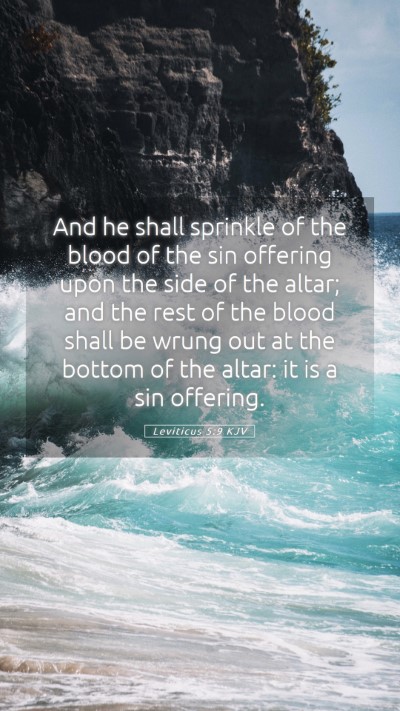Understanding Leviticus 5:9: A Comprehensive Commentary
Bible Verse: Leviticus 5:9
Verse Text: "Then shall he sprinkle of the blood of the sin offering upon the wall of the altar, and the rest of the blood shall be wrung out at the bottom of the altar: it is a sin offering."
Overview
Leviticus 5:9 is a key passage in establishing how sin offerings were to be conducted within the Old Testament sacrificial system. It emphasizes the importance of atonement and the meticulous nature required in approaching God for forgiveness.
Insights from Commentaries
This verse has been interpreted and explained by various prominent scholars. Below are summarized insights drawn from public domain commentaries:
-
Matthew Henry's Commentary:
Henry emphasizes the act of sprinkling the blood, which symbolizes the application of atonement directly upon the altar. He discusses how the altar represents the divine presence, indicating that the sin offering is not merely a ritual but an essential act for reconciliation with God. It highlights the seriousness of sin and the need for a proper approach to God for forgiveness.
-
Albert Barnes' Notes:
Barnes highlights the sacrificial system as a foreshadowing of Christ’s ultimate sacrifice. He explains that the specific actions of sprinkling the blood demonstrate the requirement for purification. Barnes notes that this meticulous ritual reflects the broader theological understanding of sin, judgment, and the need for redemption. The blood’s significance points to life itself, which is offered up for atonement.
-
Adam Clarke's Commentary:
Clarke offers a practical perspective, drawing attention to the communal implications of sin offerings. He discusses how sin affects not just the individual but the community as a whole. Clarke also notes the symbolism of the blood as an essential element in the covenant relationship between God and His people. The act of wringing out the blood at the base of the altar signifies the totality of the offering, emphasizing that no part of the sacrifice is to be viewed lightly.
Theological Reflections
The examination of Leviticus 5:9 reveals significant theological implications:
-
Atonement:
The verse underscores the doctrine of atonement, central to both Jewish and Christian theology. The meticulous rituals demonstrate the seriousness of sin and the steps necessary to seek forgiveness.
-
Shadows of Christ:
This sin offering foreshadows Christ’s sacrificial death on the cross, where His blood was shed for the atonement of humanity’s sins. The rituals laid out in Leviticus serve as types and shadows pointing to Christ’s ultimate sacrifice.
-
Holiness of God:
The processes outlined in this verse highlight God’s holiness and the requirement for His people to approach Him in a manner that recognizes His purity and justice.
Practical Application
Understanding this verse can lead to several practical applications for today’s believers:
-
Repentance:
It serves as a reminder of the need for repentance and seeking forgiveness through Jesus Christ, who is the fulfillment of the sacrificial system.
-
Community Responsibility:
Just as individual sin had corporate implications in Israel, today’s believers are reminded of their responsibility towards one another in maintaining the purity of the church.
-
Seriousness of Sin:
This verse encourages a serious perspective on sin, urging believers to acknowledge its consequences and approach God with a sincere heart.
Cross References
Related Bible verses that provide additional context and meaning include:
- Hebrews 9:22 - Discusses the necessity of blood for the remission of sins.
- Exodus 12:7 - The principle of applying blood for protection and deliverance.
- Leviticus 4:30 - The process of sin offerings and the significance of blood.
Conclusion
Leviticus 5:9 serves as a profound reminder of the seriousness of sin and the sacredness of the rituals that God established for atonement. Through a careful study of this verse, believers can gain insight into the nature of God’s holiness, the weight of sin, and the hope provided through the ultimate sacrifice of Christ. This engagement with Scripture reveals not only the meaning of Bible verses but also enhances our understanding and application of biblical teachings in our daily lives.
Keywords for Further Study: Bible verse meanings, Bible verse interpretations, Bible verse understanding, Bible study insights, Biblical exegesis, understanding Scripture, how to interpret Bible verses, and significance of Jesus' teachings.


